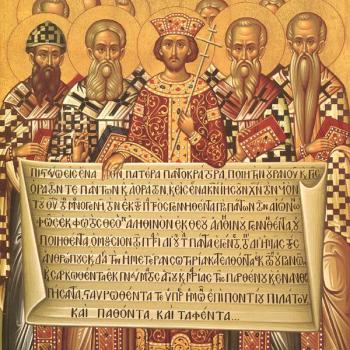To be sure, in some few translations of John, a few try to highlight this by saying something like, “In the archon was the Word,” but most translations avoid this because they do not want interpreters to get confused with the word archon, fearing possibly it would lead a reader astray by accepting some Gnostic metaphysical theory instead of the way the text tries to establish a unified, single archon in which is found the Word. Others, however, try something else, suggesting we read it as “in the principality” or “principle” or even, loosely, “in the kingdom” was the Word, suggesting more the relationship between the Word with the kingdom of God in the beginning of John.
The difficulty of the opening of John, and how to interpret it, is much better realized by those who read it in Greek. This is why ancient commentaries, by those who could read or speak in Greek, were able to reflect upon its many possible implications better than those who read it merely in English. All the possible meanings and interpretations, based upon the nuances of the Greek grammar, and the range of meanings found in each of the words, led to some interesting and rather nuanced theological which are not so readily ascertained by those reading it in translation, and yet those nuances are important for the theological enterprise, because how they are read explains the diverse ways Christology and the Theology of God have developed as a result of the Gospel of John.
![Didymus the Blind by Lizarazo999 (Own work) [Public domain], via Wikimedia Commons](https://wp-media.patheos.com/blogs/sites/637/2016/11/Didymus_the_blind-169x300.jpg)
Now if you were to think that the beginning is a particular time … on examination you would find that it presupposes time; the word beginning has not one meaning but many. In fact (without prolonging my treatment), sometimes it means cause, as in this case: heaven and earth exist in the cause, wisdom being the cause of their existence and condition as well. The world, you see, did not come into existence independently, without being generated; everything was made by the Word, remember, and in Christ Jesus “there were created things on earth and things in heaven, things visible and invisible”; in the Son and for him “all things hold together,” for “he is before all things.” Without the Word of God, in fact, who is neither interior, nor uttered, but an actual word, the substantial Word of God, nothing could exist. In other words, just as an architect … designs a city for building … encompassing in itself. At other times the word beginning means kingly rule, so that here too he has made everything as king and possessing authority; …. he did not have material available to him for the substance of the universe….[1]
Those who think they can pick up Scripture, read it, and interpret it based upon their simple reading, will miss out and likely go astray because of what knowledge they lack; they might think they need nothing from the theological tradition established by men and women who came before them, but they would be losing out what those who came before them had set as to be universally held. Scripture itself shows us we must be careful when dealing with tradition, and not abandon what it teaches, when it states: “Remove not the ancient landmark which your fathers have set” (Prov. 22:28 RSV).
While many passages do not give as much difficulty and complexity as the opening of John, many of them do, and so what is true with this text, is true others. Relying upon translation will give someone an element of what was meant by the text, but they will have lost of the content that they will likely be led astray. Without secondary tools such as the tradition which produced the Bible and continues to present it to us today, it is easy for theological change and innovation to occur, causing scandal as the landmarks of Christian theology end up being abandoned.
[1] Didymus the Blind, Commentary on Genesis. trans. Robert C. Hill (Washington, DC: Catholic University of America Press, 2016), 25-6.
Stay in touch! Like A Little Bit of Nothing on Facebook:
A Little Bit of Nothing













